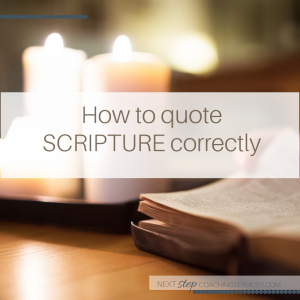
Including Scripture in our writing is one of the practices that will strengthen our writing, while at the same time point others to Christ.
Today let’s look at the mechanics of how to quote Scripture correctly.
The beginning quotation mark means this is where you start copying and then the end quotation mark means this is where you stop copying.
A reminder that quotation marks mean you are copying word for word. Do not change anything. One easy way to make sure your Scripture is correct is to use Biblegateway. At this site you can look up a verse, and then copy and paste it into your document. Note that if you do use Biblegateway, you will need to remove the individual verse numbers.
Sometimes you will quote something that is already in quotation marks. This happens often when quoting something Jesus said. Let’s say you want to quote this statement Jesus makes in John 14:6: “I am the way, and the truth, and the life; no one comes to the Father but through Me.”
If I want to include this in my manuscript, I use regular quotation marks to show I’m copying the verse, and I change the already existing quotation marks to single quotation marks. You can see this done below. This is called single inside of double quotation marks.
In John 14:6 Jesus says, “‘I am the way, and the truth, and the life; no one comes to the Father but through Me.’”

Try to lead into your quotation, instead of just plopping it into your paragraph. The lead-in is called the introductory phrase. The introductory phrase below is “Scripture states.” Notice how the introductory phrase is followed by a comma before the quotation begins.
Scripture states, “For God has not given us a spirit of timidity, but of power and love and discipline” (2 Timothy 1:7).
The introductory phrase can be short and simple, as above. Another variation in the introductory phrase is to include the Scripture reference. The introductory phrase below is “We find this promise in 2 Timothy 1:7”
We find this promise in 2 Timothy 1:7, “For God has not given us a spirit of timidity, but of power and love and discipline.”
In the above examples, each quotation is followed by information in parentheses. This is called parenthetical documentation. This is also referred to as in-text citation. In a nutshell this is important because you are telling your reader where you got your information.
How do you know what to put in the parentheses? Let’s look at the examples again.
If you have not included the Scripture reference before the quotation in your introductory phrase, then you include the Scripture in the parenthetic documentation.
Scripture states, “For God has not given us a spirit of timidity, but of power and love and discipline” (2 Timothy 1:7).
If the Scripture reference is in the introductory phrase before the quotation, no parenthetic documentation is needed.
We find this promise in 2 Timothy 1:7, “For God has not given us a spirit of timidity, but of power and love and discipline.”
Ending punctuation always goes after the parenthetical documentation. Note in the example below that the period is placed after the last parentheses.
Scripture states, “For God has not given us a spirit of timidity, but of power and love and discipline” (2 Timothy 1:7).
Note in the example below, no parenthetical documentation is used, so the period goes after the last word, and then is followed by the last quotation marks.
We find this promise in 2 Timothy 1:7, “For God has not given us a spirit of timidity, but of power and love and discipline.”
Any questions? Let me know!
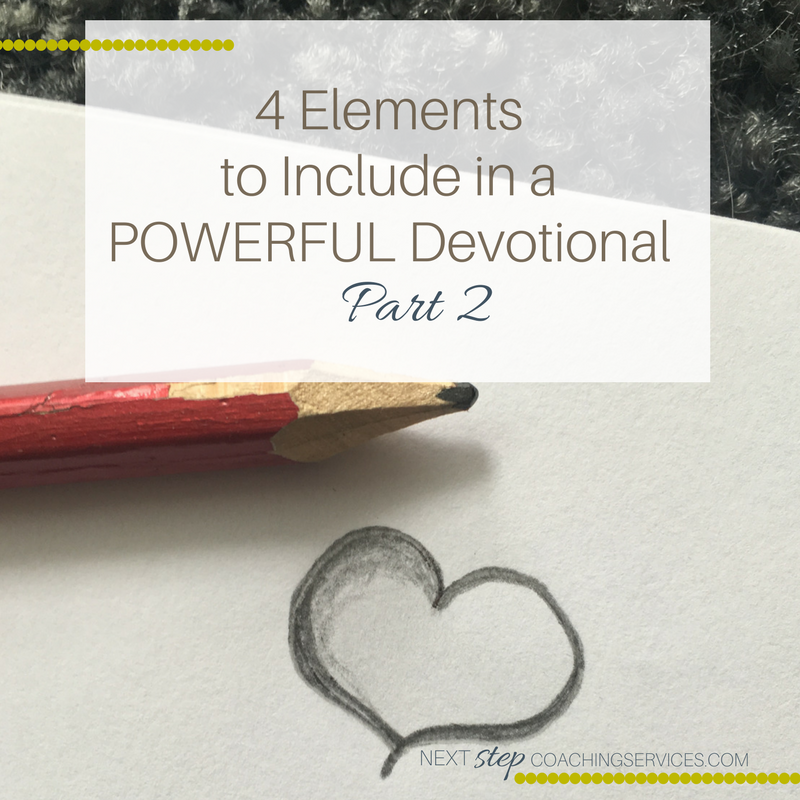
Bonus coaching: Make sure to join Amy on Facebook Live today on the Next Step Coaching Facebook page at 4:30 pm Eastern Time. She’ll be sharing a tip to make your speaker bio more engaging. If you want to join live or watch the replay, click on the graphic below. Read on for Part 2…
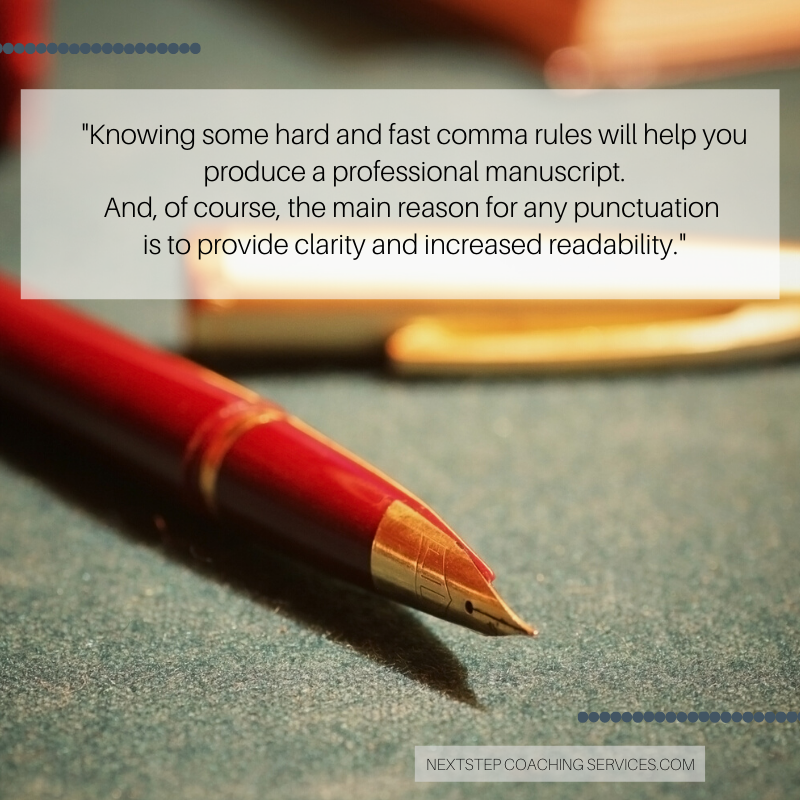
Because you can hardly read a paragraph without stumbling on a comma, knowing some hard and fast comma rules will help you to produce a professional manuscript. And, of course, the main reason for any punctuation is to provide clarity and increased readability. Today let’s look at five rules for using commas. To Separate Words…

Investing in a writing coach and/or editor is an investment that will pay off! Here are some top benefits of hiring me as your writing coach and/or editor. I’m your partner. My business partner Amy Carroll began Next Step Coaching Services to help speakers and writers take the next steps in their ministry journeys. We…
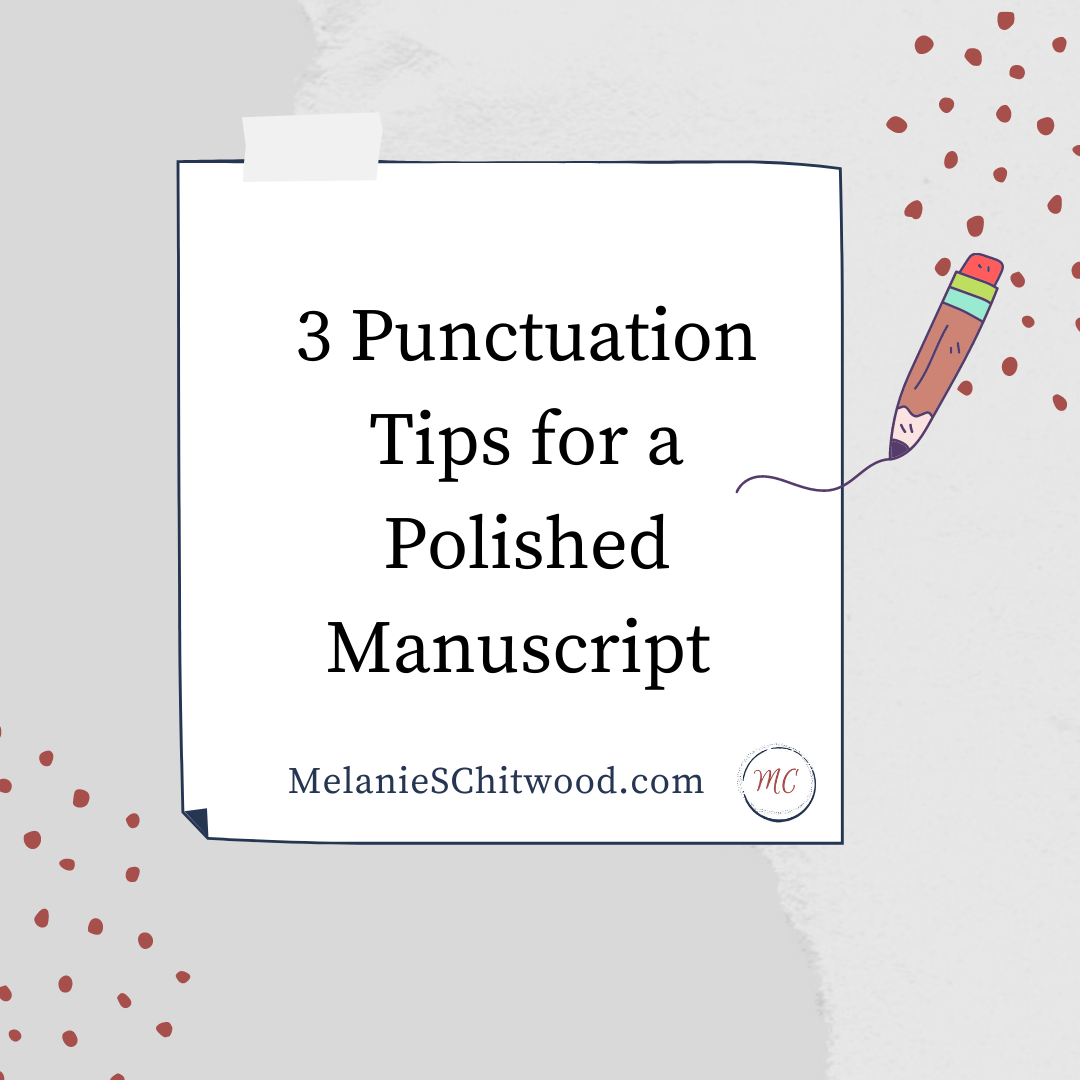
Learning punctuation and grammar rules can give you a little boost of confidence that you’re writing right! Here are a few punctation errors I commonly see as an editor. Can you start a sentence with a coordinating conjunction? (words such as and, but, so) The short answer: yes! Coordinating conjunctions are words used to join…
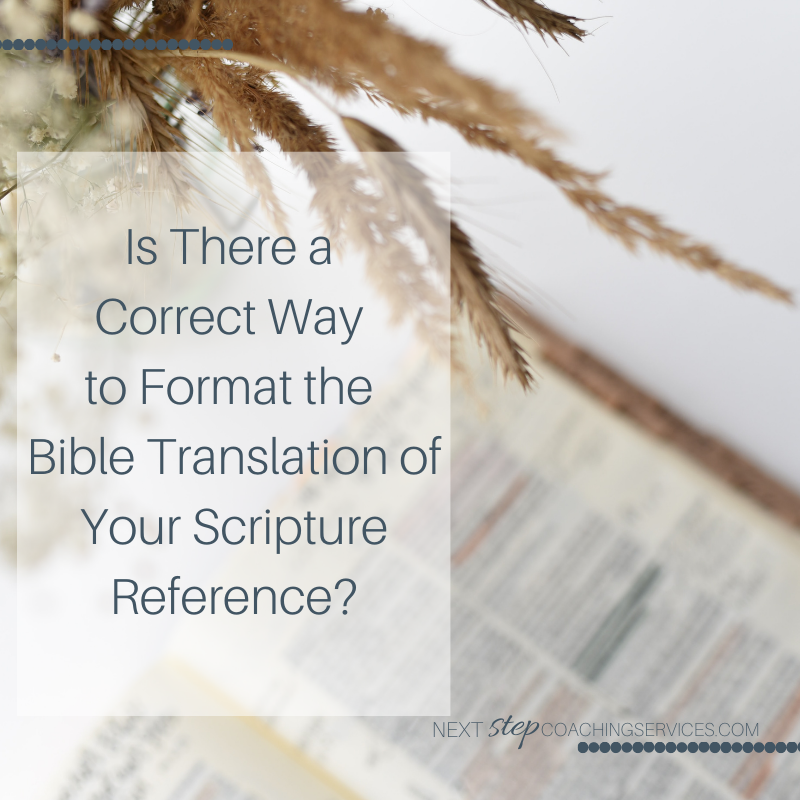
Formatting anything to do with Scripture references in the correct way is important when you’re writing a manuscript. Let’s look at how to handle formatting the Bible translation of your Scripture references. For your manuscript, choose a translation of the Bible that you’ll use the most frequently, your primary or main version. The first time…
The writing process varies and is unique to each writer. I do a lot of prewriting – thinking, journaling, jotting down thoughts all over the place in various notebooks or computer. Then I take these thoughts and start giving them some kind of working title/subtitle, structure and direction. Finally, I start writing a rough…
I was told recently that scripture quotations must always be italicized. That was a new one to me. Is that some industry standard of which I was unaware, or is that just this particular firm’s opinion?
Melanie says:Hmmm…It is not the standard of MLA or APA citing. However, as you said, each publication has it’s own style guide and that might be the case here. Thanks for checking!
Melanie says: Oops. Its own. Not it’s! Ellen M King says:According to “The Christian Manual of Style” italics should not be used for verses. It was a fad a while back, but thankfully I think we’re seeing the end of it. In fact, in two version (KJV and NKJV), it is proper to remove the italics they use as those italics are simply to tell the reader that the word was added by the translators and does not appear in the original. (This is one instance when we should not render the Scripture exactly as they appear in Bible Gateway.) I prefer to offset biblical quotations in the text so that they can retain their original punctuation and make them stand out too. Makes my job a lot easier.
Melanie says: Virginia Spears Haynes says:Thank you so much for these Scripture writing tips. I am presently teaching Systematic Theology and there are several writing projects. I am using your information, and yes, giving you credit. I added for my students: Please add an interesting title, the translation being used, and number the pages.
Melanie S. Chitwood says:Hi Virginia, Thank you so much for purchasing my workbook – and for letting me know it’s helpful!
That means a lot to me!
Thanks, Melanie! I have struggled with where to put the ending punctuation when quoting Scripture. Now I know!
melanie chitwood says: You’re welcome! Always makes me feel more confident to know the rules! Anita says: Your reference nothing about the version. I have a main one I use but often use other versions? Melanie says:Good question. At the beginning of the entire manuscript, include a copyright for the version of the Bible you primarily will use. If you do this, then you do not have to state in each parenthetical documentation the version. So at the beginning of the manuscript your copyright statement could be this:
Unless indicated otherwise, all Scripture quotations are taken from the Holy Bible, New Internation Version, NIV. Copyright 1973, 1978, 1984 by the International Bible Society. All rights reserved. Then in your manuscript if you use a version other than your primary version, you put the version in the parenthetical documentation like this: (James 1:5 NASB). I hope this helps! Also, you can google parenthetical documentation.
I usually put my Scripture quote inside a quote box. it stands out and to me, it seems to say this is quoted from the Bible. I also give the reference and version as well. on occasion, i use more than one Biblical quote in a post. if i use a bunch of Biblical quotes, I tend to write the reference and link it to the Bible Gateway reference I’m choosing. I realize that wouldn’t work for a book of course. I’m getting ready to write a devotional book. again, i plan to have one passage to highlight each reading around. i expect to have it either at the beginning or end of the post but in an indented, quote format…or is that incorrect? I try to set them apart because I’m also trying to encourage memorization or near memorization and having it separated out helps. please advise. i enjoyed your part of the weekend writing conference today. very helpful:)
Melanie says: If I’m understanding correctly, then yes! It sounds like you’re doing that correctly. Donna says:Please help! I am writing devotions from the book of Proverbs. (Should “book” in “book of Proverbs” be capitalized?)
My main question is: Sometimes the verse I am quoting ends in a comma or a semicolon. What do I do? Is it okay to substitute a period if that is where I am ending the quote?
Also, I was planning to start each devotion with a verse or passage from Proverbs on the top of the page with the reference (such as, Proverbs 3:4-5) in bold. Since it will be distinctive from my comments, is it okay to NOT put it in quotation marks? Here is an example: Proverbs 3:5-6 (NIV)
Trust in the Lord with all your heart
and lean not on your own understanding;
in all your ways submit to him,
and he will make your paths straight. Thank you!
Do not capitalize book. Yes, you can substituted period. Yes, you can put the bible quotation at the beginning of each chapter in bold (or italics )with no quotation marks. More commonly it would be written like this: Trust in the Lord with all your heart
and lean not on your own understanding;
in all your ways submit to him,
and he will make your paths straight,
— Proverbs 3:5-6 (NIV) Whichever format you use, just make sure you’re consistent. Just be consistent.
In my devotion, I am referring to several Scriptures in one chapter, but I don’t want to include the whole chapter. Is it okay to list them one after the other, as below? even though I have skipped verses in between? Proverbs 10:6, 8, 10-11, 13-14, 18-19, 21, 31-32 (NIV)
6 Blessings crown the head of the righteous,
but violence overwhelms the mouth of the wicked.
8 The wise in heart accept commands,
but a chattering fool comes to ruin.
10 Whoever winks maliciously causes grief,
and a chattering fool comes to ruin.
11 The mouth of the righteous is a fountain of life,
but the mouth of the wicked conceals violence.
13 Wisdom is found on the lips of the discerning,
but a rod is for the back of one who has no sense.
14 The wise store up knowledge,
but the mouth of a fool invites ruin.
18 Whoever conceals hatred with lying lips
and spreads slander is a fool.
19 Sin is not ended by multiplying words,
but the prudent hold their tongues.
21 The lips of the righteous nourish many,
but fools die for lack of sense.
31 From the mouth of the righteous comes the fruit of wisdom,
but a perverse tongue will be silenced.
32 The lips of the righteous know what finds favor,
but the mouth of the wicked only what is perverse.
In my devotion, I am referring to several Scriptures in one chapter, but I don’t want to include the whole chapter. Is it okay to list them one after the other, as below? even though I have skipped verses in between? Proverbs 10:6, 8, 10-11, 13-14, 18-19, 21, 31-32 (NIV)
6 Blessings crown the head of the righteous,
but violence overwhelms the mouth of the wicked.
8 The wise in heart accept commands,
but a chattering fool comes to ruin.
10 Whoever winks maliciously causes grief,
and a chattering fool comes to ruin.
Etc. – I won’t list each verse here. 🙂
How would you place the quotations in this verse? I did my best, but I am not sure about it. Luke 15:11-12
11 “Then He said: ‘A certain man had two sons.12 And the younger of them said to his father, “Father, give me the portion of goods that falls to me.” So he divided to them his livelihood.'” Thank you in advance, jh
Always put single quotation marks inside of double, if you come to something that is already a quote. “Then He said, ‘A certain mad had two sons. And the younger of them said to his father, ‘Father, give me the portion of goods that falls to me.’ So He divided to them his livlihood.'”
It’s tricky because there’s two sets of single quotation marks. Remembering this might help: A regular quotation marks means I’m copying something. A single quotation mark means that what I’m copying was already in quotation marks.
Hope this helps!
Hi Melanie,
I’m quoting a long scripture at the beginning of a chapter as the introduction. Revelations 12:7-11; should I use Scripture states, ” at the begging or should I just go right into the quote? and should I use ” ” for the whole thing? Also, should the citation be at the end like (Revelations 12:7-11?
Please let me know what you think.
Thanks
Niya
At the beginning of my devotions, I have the full passage and reference for the passage (I can’t show it here, but the reference is in bold.) Such as:
Proverbs 6:20-35 (NIV)
Then after a couple of paragraphs, I want to refer to one of the verses in the passage. I was thinking of doing it this way with the verse in italics: Vs 21 – Bind them always on your heart; fasten them around your neck.
This speaks of keeping his commands top of mind continually, consulting His Word for each situation in life. “Vs 21” will not be in italics, just the Scripture: Bind them always on your heart; fasten them around your neck.
Is that OK? I really did not want to use quotation marks for Scripture. When I use italics for Scripture, it will be for only one verse, or part of a verse that I am referring to for a second time in that devotion.
Also, can I abbreviate verse by using vs? If so, does it need a period? — Vs.
I am referring to another verse a second time in this devotion this way: Vs 32 tells us that a man who commits adultery has no sense; whoever does so destroys himself. The actual Scripture (that a man who commits adultery has no sense; whoever does so destroys himself) will be italicized. “Vs 32 tells us” will not be italicized. Is that correct?
Is it OK to refer to the two Scriptures differently? (Vs 21 with a dash and vs 32 tells us?)
Thanks for all your help!
I have the same questions as to how to correctly abbreviate the word “verse” in referencing scripture. I do not see Melanie’s reply.